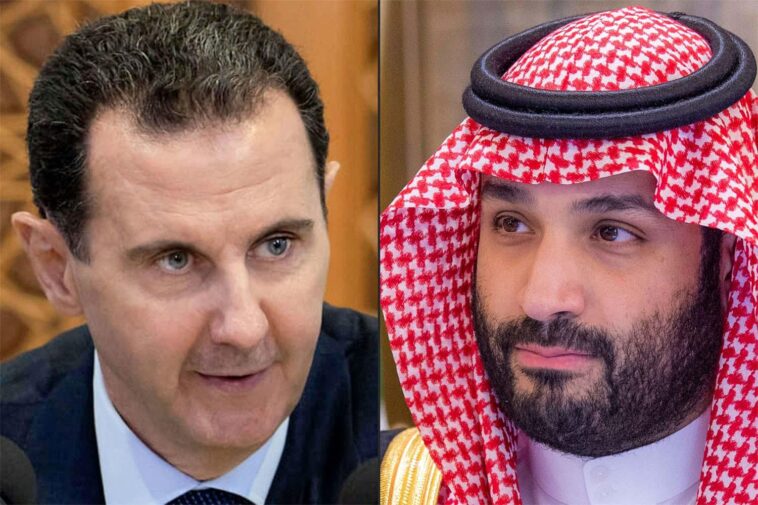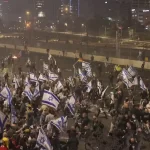March has been a month full of surprises in the Middle East, as Saudi Arabia and Syria have agreed to reopen their embassies after the Muslim holiday of Eid al-Fitr. This follows the shock announcement that the formerly implacable arch-rivals Saudi Arabia and Iran have agreed to restore diplomatic relations. (21-22 April).
This means that Syrian President Bashar al-Assad, who has been shunned by Arab leaders because of the crimes his regime has committed against Syrian citizens, is now expected to be welcomed back into the fold, and he may soon return to Arab summits and the Arab League, from which he was suspended in 2011.
A few days ago, Saudi Foreign Minister Prince Faisal bin Farhan Al Saud hinted that Syria’s suspension from the Arab League could be lifted, but quickly added that it was too early to discuss this possibility, as the matter would be examined at the upcoming Arab League meeting in April in Saudi Arabia.
Syria’s membership in the Arab League was suspended in November 2011, during the Arab Spring, when the Syrian regime killed approximately 5,000 demonstrators and opponents. During the next ten years of the country’s civil war, various domestic and foreign forces fought the government and frequently each other, resulting in over 600,000 fatalities.
The regime of Bashar al-Assad has repeatedly and massively violated human rights and on occasion employed chemical weapons.
The majority of Arab nations imposed travel restrictions on senior regime officials and other sanctions, including restrictions on investments and transactions with the Syrian Central Bank.
The only Arab governments that refused to impose sanctions on the Syrian regime were those of Iraq, Yemen, and Lebanon, where Iran – Hafez al-Assad’s ally – exerts a substantial amount of influence.
Last year, while addressing the UN General Assembly, UN Secretary-General Antonio Guterres stated that the Syrian government was responsible for “massive violations of human rights and international humanitarian law” and that “the perpetrators of these crimes and the use of chemical weapons against civilians must be held accountable.”
Although at the outset of the conflict it appeared that the Assad regime would fall, the intervention of Iran and Russia, which has been conducting airstrikes and ground operations in Syria, has altered the entire situation, and it is now evident that the regime will not be defeated.
It is important to note that Saudi Arabia and Qatar sided with some rebels, while Turkey fought Islamic State (ISIL), the Kurdish-Arab SDF, and the Syrian Army and presently occupies large swaths of northwestern Syria. In Syria, the United States fought both ISIL terrorists and pro-government forces.
The realization that the Damascus regime has prevailed, coupled with war fatigue, has led several Arab governments to reconsider the Syrian conflict and conclude that it is in their national interest to restore relations with the Assad regime.
Tunisia was the first country to reconsider its relations with Damascus in 2015, followed by the United Arab Emirates, which reopened its embassy in Damascus in 2018, stating that Arab countries should be present in Syria and work diligently to resolve the conflict. In 2019, Jordan dispatched a charge d’ affaires to Damascus, followed by Oman in 2020.
Egyptian Foreign Minister Sameh Shoukry proclaimed last month, at the urging of Russian Foreign Minister Sergei Lavrov, that Cairo supported the normalization of relations between Arab countries and Syria.
Last month’s devastating earthquake in Turkey and Syria, which left tens of thousands of people dead and millions homeless, sparked an international outpouring of sympathy for the victims and prompted several Arab nations, including Saudi Arabia, to send hundreds of tons of aid to the quake victims.
The announcement of the planned reopening of embassies in Damascus and Riyadh, made a few weeks after the devastating earthquake and the desperate need for the provision of international aid to the victims, provided the Saudi Government with an opportunity to change its policy on Syria without losing face and to remove one of the reasons for confrontation with Iran, which has been a strong supporter of the Assad regime.
If the rehabilitation of Assad and his return to the Arab fold are contingent on him accepting the safe return of millions of Syrian refugees from Turkey and other countries, it would be easier for many nations to accept that he would no longer be an international pariah for the human rights violations committed by his regime.
The international community would be more willing to swallow the bitter pill that he will not be punished for his crimes if it would better the plight of Syrian refugees seeking asylum in foreign countries and permit them to return home safely.
In an article published in Responsible Statecraft, James Dorsey argues that the Arab proposal to bring Assad in from the cold could provide a way out of a quagmire because “it would increase the leverage of the United States and Europe to ensure that political reform is the foundation of Assad’s engagement with elements of the Syrian opposition.”
Also read this:“India to play major role in OneWeb’s launch, looking to rope in private players,” Sunil Mittal
In other words, instead of rejecting any solution that does not entail the removal of Assad from power, the United States and Europe could lift sanctions contingent upon agreement and implementation of reforms. Similarly, the United States and Europe could condition sanctions relief on the safe, unimpeded, and orderly return of refugees.




